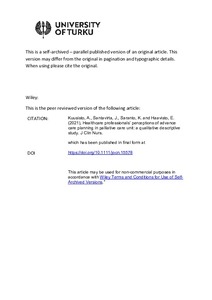Healthcare professionals' perceptions of advance care planning in palliative care unit: a qualitative descriptive study
Kuusisto Anne; Santavirta Jenni; Saranto Kaija; Haavisto Elina
https://urn.fi/URN:NBN:fi-fe2021042823437
Tiivistelmä
Aims and objectives
To describe healthcare professionals' perceptions of advance care planning (ACP) in palliative care unit in hospital ward or outpatient clinic.
Background
Clinical guidelines recommend timely ACP as a central component of patient-centred palliative care. However, the ACP concept and terminology have been judged to be confusing, and practices are not established. Professionals' views are needed for ACP adoption and usage.
Design
Qualitative descriptive design.Methods The study used purposive sampling. The data were collected through focus group interviews with registered nurses and practical nurses and individual or couple interviews with physicians and social workers. The data (n = 33) were analysed by inductive content analysis. The study complied with the Consolidated Criteria for Reporting Qualitative Research (COREQ) checklist.
Results
Three main categories emerged: Information content of ACP, coordination of care activities through ACP, and support for patients' and family members' coping. The information content of ACP included assessment of need for patient care, preparing for changes in patient's state of health and proactive medication. Coordination of care activities through ACP contained ACP care planning, cooperation and work practices between healthcare professionals. Support for patients' and family members' coping included communication between patient, family members and professionals and promoting patient self-care.
Conclusions
ACP is a useful and proactive tool for integrating patient-centred information, care and services as well as support for patients' and family members' coping. Palliative care activities can be coordinated through ACP in a multidisciplinary manner. ACP is significant and relevant for both professionals' work and patient care throughout the service system.Relevance to clinical practice Results highlight the importance of proactive, concrete and holistic ACP. ACP should be up to date to reflect patient's current wishes. Raising professional awareness and implementing ACP into work processes are essential. Results can be utilised in planning and implementing interprofessional in-service training.
Kokoelmat
- Rinnakkaistallenteet [29337]
